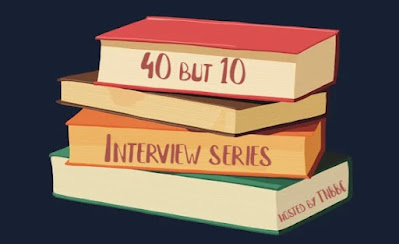Today we are joined by Richard
Jeffrey Newman. Richard has published three books of poetry, T’shuvah
(Fernwood Press 2023), Words for What Those
Men Have Done (Guernica
Editions 2017) and The Silence of Men
(CavanKerry Press 2006), as well as a chapbook, For My Son, A Kind
of Prayer (Ghostbird
Press 2016). In addition, he has co-translated three books of classical Persian
poetry, most recently The Teller of Tales:
Stories from Ferdowsi’s Shahnameh
(Junction Press 2011). Newman is on the executive
board of Newtown Literary, a
Queens-based literary non-profit, and he curates the First Tuesdays reading
series in Jackson Heights, NY. He is Professor of English at Nassau Community
College. His website is www.richardjnewman.com.
Why do you write?
I write to create—for myself, on
my own terms, and in the most expansive way the phrase can be understood—the
political meaning of my life; and only if I believe that meaning will be worth someone
else’s time and/or money do I presume to try to publish.
What made you start writing?
I am a survivor of childhood
sexual violence. I could never have explained it this way at the time, but when
I started writing poetry in junior high school, I did so because it proved to
me that I had a voice, that my voice had a body, and that I deserved to be
heard, even if—because it was some years before I showed anyone what I was
writing—the only audience I had was me. There is no aspect of my work, poetry
or prose, that does not find its roots in that initial need not to succumb to
the voicelessness that the men who violated me tried to force on me.
Do you have any hidden talents?
I don’t know if I would call it
hidden, because I don’t try to hide it, but I play piano. I play mostly for
myself, and mostly improvisation, since I read music very slowly and
never developed a repertoire. I’ve reached the point, though, where I can say,
honestly, that I’m good enough to have played professionally if I’d been more
disciplined about it when I was younger. I wrote about my relationship with
music on my blog
and, if you’re interested, you can listen here
to some music I composed in the 1990s when, for a brief time, I tried to get
serious.
What’s the most useless skill
you possess?
I can fold a fitted sheet.
Describe your book in three
words.
Hard won peace.
Describe your book poorly.
A self-indulgent descent into
second-person navel gazing.
If you could spend the day with
another author, who would you choose and why?
June Jordan. She was my first
poetry teacher way back in the 1980s. She saw something in me that she tried to
get me to see at the time, but I was so afraid of even my own shadow—the
ongoing impact of the sexual violence I survived—that I retreated inside myself
every time she got close. Still, I read her poetry and her essays assiduously,
almost religiously, and through them I learned so much about the kind of writer
I wanted to be, that I hope I have become. June is dead now, but if I could, I
would love to spend the day with her, to tell her how much she and her work continue
to mean to me and to learn something about what I am sure she would still have
to teach me.
What is your favorite book from
childhood?
The earliest favorite I remember,
which goes back to when I was three or four—and this is significant to me
because I remember very little from that time in my life—was Harold and The
Purple Crayon, by Crockett Johnson.
What are you currently reading?
Like most people, I am reading
more than one book at a time. Because I am also prepping for my spring classes,
you happen to have caught me when the pile is higher than usual. Here they are,
in no particular order:
a. The
Oxford Anthology of African-American Poetry, edited by Arnold Rampersad
b. Voices
Within The Ark: The Modern Jewish Poets, edited by Howard Schwartz and
Anthony Rudolf
c. Essential
Voices: Poetry of Iran and Its Diaspora, edited by Christopher Nelson
d. Days
When I Hide My Corpse in a Cardboard Box, by Lok Fung, translated by
Eleanor Goodman
e. Claims
for Poetry, edited by Donald Hall
f.
The First Book: Twentieth-Century Poetic
Careers in America, by Jesse Zuba
g. Harlem
Shadows, by Claude McKay
h. Alive
At The End of The World, by Saeed Jones
i.
Cruelty, Ai
j.
Peel My Love Like An Onion, by Ana
Castillo
k. Deaf
Republic, by Ilya Kaminsky
l.
The Arabian Nights, translated by
Husain Haddawy
What is under your bed?
Nothing but dust.


No comments:
Post a Comment